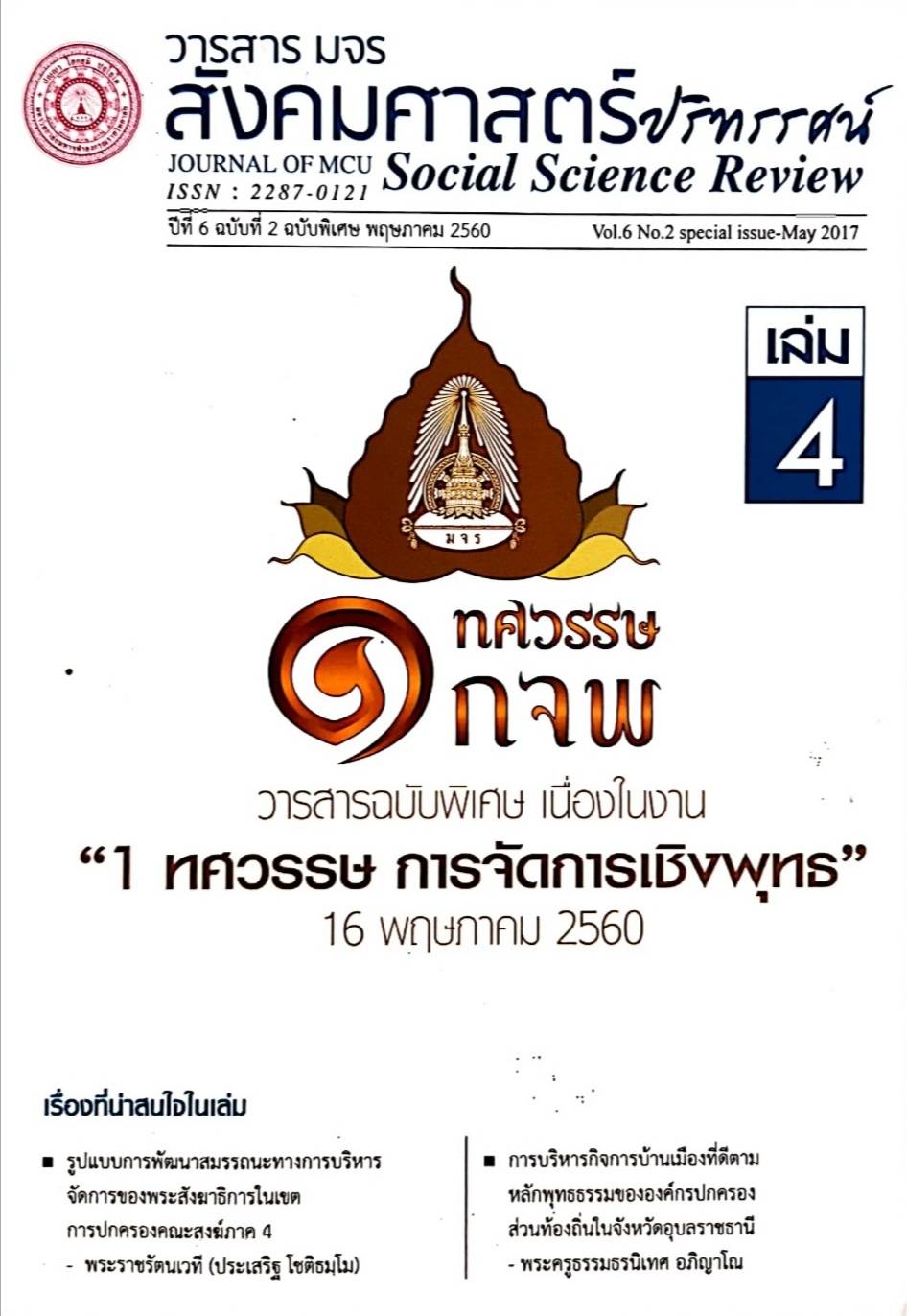การพัฒนาทรัพยากรมนุษย์ตามหลักพุทธศาสนาในการปลูกฝัง ความรู้และคุณธรรมของนักศึกษามหาวิทยาลัยราชภัฏภาคเหนือตอนล่าง
คำสำคัญ:
การพัฒนาทรัพยากรมนุษย์ตามหลักพุทธศาสนา, การปลูกฝังความรู้และคุณธรรมบทคัดย่อ
งานวิจัยนี้นาเสนอเรื่อง การพัฒนาทรัพยากรมนุษย์ตามหลักพุทธศาสนาในการปลูกฝัง
ความรู้และคุณธรรมของนักศึกษามหาวิทยาลัยราชภัฏภาคเหนือตอนล่าง วัตถุประสงค์ สรุป
อภิปรายผล และข้อเสนอแนะเพื่อ 1. หลักธรรมสาหรับการพัฒนาทรัพยากรมนุษย์ตามหลัก
พระพุทธศาสนา 2.หลักธรรมที่สอดคล้องกับการพัฒนาทรัพยากรมนุษย์ตามหลักพุทธศาสนาและ
3. แนวทางการพัฒนาทรัพยากรมนุษย์ตามหลักพุทธศาสนาในการปลูกฝังความรู้และคุณธรรมของ
นักศึกษามหาวิทยาลัยราชภัฏภาคเหนือตอนล่าง ได้แบ่งออกเป็นการวิจัยเชิงปริมาณและการวิจัย
เชิงคุณภาพ การวิจัยเชิงปริมาณกลุ่มตัวอย่างทั้งหมด จานวน 396 คนมาวิเคราะห์อธิบายเชิงสถิติ
พรรณนา โดยใช้โปรแกรมสาเร็จรูปการวิเคราะห์ข้อมูลทางสังคมศาสตร์ การวิจัยเชิงคุณภาพจาก
การสัมภาษณ์เชิงลึก (In-depth interview research) อาจารย์ผู้สอนเกี่ยวกับคุณธรรมและ
จริยธรรมหรือวิชาทางด้านการพัฒนาทรัพยากรมนุษย์ จานวน 24 คน การสนทนากลุ่ม (Focus
Group Discussion) จานวน 10 คน เครื่องมือที่ใช้ คือ แบบสอบถาม (Questionnaire) สัมภาษณ์
เชิงลึก (In-deep Interview) และการสนทนากลุ่ม การวิเคราะห์ทางสถิติโดยใช้สถิติเชิงพรรณนา
(Descriptive Statistic) หาค่าร้อยละ ส่วนค่าเฉลี่ย ค่าเบี่ยงเบนมาตรฐาน ใช้สถิติวิเคราะห์
(Statistical Analysisผลการวิจัยพบว่า กลุ่มตัวอย่างส่วนใหญ่ คือเพศหญิง จานวน 261 คน คิด
เป็นร้อยละ 65.9 รองลงมาคือ เพศชาย 135 คนส่วนใหญ่ คืออายุ 18-30 ปี จานวน 387 คน คิด
เป็นร้อยละ 67.7 ระดับการศึกษาชั้นปีที่ 3 จานวน 161 คน คิดเป็นร้อยละ 40.7 มีรายได้ตั้งแต่
5,001-10,000 บาท จานวน 138 คน คิดเป็นร้อยละ 34.8 อาชีพเกษตรกรรม จานวน 153 คน คิด
เป็นร้อยละ 38.6 หลักธรรมสาหรับการพัฒนาทรัพยากรมนุษย์ตามหลักพระพุทธศาสนาของนักศึกษา
มหาวิทยาลัยราชภัฏภาคเหนือตอนล่าง พบว่าภาพรวมอยู่ในระดับปานกลาง รายละเอียดรายข้อพบว่านักศึกษามีเปูาหมายในการเรียนรู้ด้วยระบบคุณธรรมมี
ค่าเฉลี่ยสูงสุดอยู่ในระดับมาก รองลงมาคือนักศึกษาได้นาหลักศีล สมาธิ
ปัญญามาใช้ในการเรียน อยู่ในระดับมาก และมีค่าเฉลี่ยต่าสุด คือได้มีการ
ฝึกอบรมจิตภาวนาโดยการทาสมาธิ อยู่ในระดับปานกลาง หลักธรรมที่สอดคล้องกับการพัฒนาทรัพยากรมนุษย์ตามหลักพุทธศาสนาของนักศึกษา
มหาวิทยาลัยราชภัฏภาคเหนือตอนล่าง พบว่าหลักฆราวาสธรรมสี่ ด้านสัจจะคือมีซื่อสัตย์จงรักภักดี
ต่อชาติ ศาสนา กษัตริย์ ด้านทมะไม่ใช้อารมณ์แก้ปัญหา ด้านขันติไม่ใช้อารมณ์แก้ปัญหา ด้านขันติ
ปฏิบัติหน้าที่เป็นด้วยความอดทน ด้านจาคะมีน้าใจช่วยเหลือเอื้อเฟื้อเผื่อแผ่ต่อผู้อื่น เบญจธรรมห้า
ได้แก่ความเมตตากรุณามีความเห็นใจ สัมมาอาชีวะไม่เลี้ยงชีพด้วยการหลอกลวง กามสังวรมีสติเมื่อ
อยู่กับเพศตรงข้าม สัจจะสุจริตต่อการเรียน สติสัมปชัญญะตั้งใจทาความดีถวายพระเจ้าอยู่หัว
แนวทางการพัฒนาทรัพยากรมนุษย์ตามหลักพุทธศาสนาในการปลูกฝังความรู้และนา
คุณธรรมของนักศึกษามหาวิทยาลัยราชภัฏภาคเหนือตอนล่าง พบว่า1) แนวทางเสนอมหาวิทยาลัย
แต่ละแห่งควรดาเนินการจัดตั้งศูนย์หรือชมรมพระพุทธศาสนาโดยมอบให้ฝุายกิจการนักศึกษา
คณะกรรมการบริหารกับมหาวิทยาลัย 2) เสนอร่วมทาบันทึกข้อตกลง (MOU) กับมหาวิทยาลัย
มหาจุฬาลงกรณราชวิทยาลัยหรือมหาวิทยาลัยมหามกุฎราชวิทยาลัยเพื่อจะร่วมกันพัฒนาปลูกฝัง
คุณธรรม 3) การมีส่วนร่วมทุกภาคส่วนทั้งคณะสงฆ์ รัฐ เอกชน ครอบครัวในการปลูกฝังคุณธรรม
4) สาขาวิชามีการสอนด้วยเนื้อสอดแทรกด้านหลักศาสนาและหลักปรัชญาชีวิตที่มีเนื้อหาด้าน
จริยธรรมและคุณธรรมไว้ใน มคอ.3 5) แนวทางกิจกรรมปฏิบัติธรรมระยะเวลาที่มหาวิทยาลัย
กาหนด
เอกสารอ้างอิง
โรงพิมพ์คุรุสภา.
ชัยวัฒน์ อัตพัฒน์ และทวี ผลสมภพ. (2529). หลักพระพุทธศาสนา. กรุงเทพมหานคร :
มหาวิทยาลัยรามคาแหง.
ถวิล อรัญเวศ. (2534). การนาพุทธวิธีในการสอนมาใช้จริยศึกษาในระดับประถมศึกษาวิทยานิพนธ์
ศึกษาศาสตรมหาบัณฑิต .บัณฑิตวิทยาลัย มหาวิทยาลัยขอนแก่น.
พระทวีป กลฺยาณธมฺโม. (2553). “การศึกษาวิเคราะห์หลักกัลยาณธรรมสาหรับการดารงชีวิตที่
ปรากฏในคัมภีร์พระพุทธศาสนา”. วิทยานิพนธ์พุทธศาสตรมหาบัณฑิต. บัณฑิตวิทยาลัย
: มหาวิทยาลัยมหาจุฬาลงกรณราชวิทยาลัย.
พระธรรมปิฎก ป.อ.ปยุตฺโต. (2543). พจนานุกรมพุทธศาสน์ ฉบับประมวลศัพท์.พิมพ์ครั้งที่ 9.
กรุงเทพมหานคร : โรงพิมพ์มหาจุฬาลงกรณราชวิทยาลัย.
วศิน อินทสระ. (2549). พุทธจริยศาสตร์. พิมพ์ครั้งที่ 2. กรุงเทพมหานคร : โรงพิมพ์เม็ดทราย..
Maslow. Abraham Harold. (1970). Motivation and Personality. New York: Harper &
Row.
ดาวน์โหลด
เผยแพร่แล้ว
รูปแบบการอ้างอิง
ฉบับ
ประเภทบทความ
สัญญาอนุญาต
ลิขสิทธิ์ (c) 2020 วารสาร มจร สังคมศาสตร์ปริทรรศน์

อนุญาตภายใต้เงื่อนไข Creative Commons Attribution-NonCommercial-NoDerivatives 4.0 International License.
เพื่อให้เป็นไปตามกฎหมายลิขสิทธิ์ ผู้นิพนธ์ทุกท่านต้องลงลายมือชื่อในแบบฟอร์มใบมอบลิขสิทธิ์บทความให้แก่วารสารฯ พร้อมกับบทความต้นฉบับที่ได้แก้ไขครั้งสุดท้าย นอกจากนี้ ผู้นิพนธ์ทุกท่านต้องยืนยันว่าบทความต้นฉบับที่ส่งมาตีพิมพ์นั้น ได้ส่งมาตีพิมพ์เฉพาะในวารสาร มจร สังคมศาสตร์ปริทรรศน์ เพียงแห่งเดียวเท่านั้น หากมีการใช้ภาพหรือตารางหรือเนื้อหาอื่นๆ ของผู้นิพนธ์อื่นที่ปรากฏในสิ่งตีพิมพ์อื่นมาแล้ว ผู้นิพนธ์ต้องขออนุญาตเจ้าของลิขสิทธิ์ก่อน พร้อมทั้งแสดงหนังสือที่ได้รับการยินยอมต่อบรรณาธิการ ก่อนที่บทความจะได้รับการตีพิมพ์ หากไม่เป็นไปตามข้อกำหนดเบื้องต้น ทางวารสารจะถอดบทความของท่านออกโดยไม่มีข้อยกเว้นใดๆ ทั้งสิ้น





